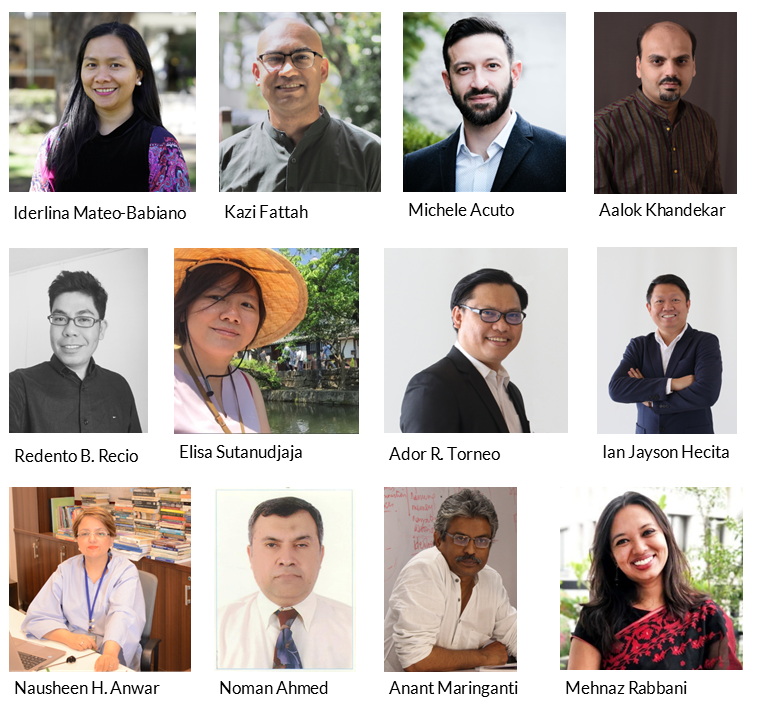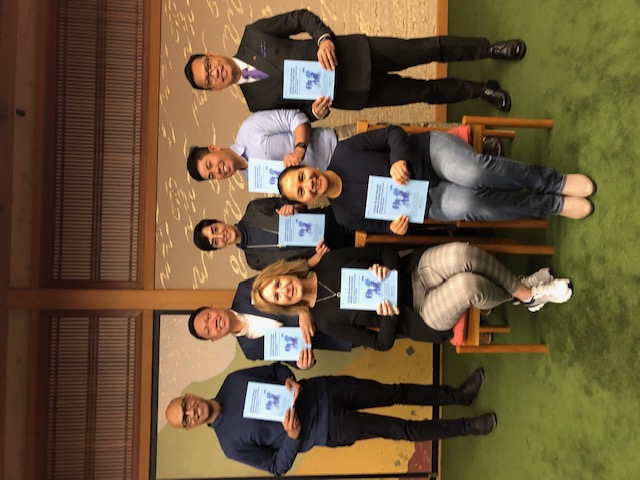The Regional Studies Association is delighted to announce another publication in its Regional Studies Policy Impact Books Series.
COVID-19 and Informal Workers in Asian Cities: Impact, response, and implications for urban recovery,
Edited by Redento B. Recio, Kazi Nazrul Fattah, Nausheen H. Anwar, Noman Ahmed, Iderlina Mateo-Babiano, Michele Acuto, Ian Jayson Hecita and Shiva Nouri
In 2021, the Regional Studies Association awarded Policy Expo funding to the project “Tackling a global pandemic in Asian Megacities: Uneven vulnerabilities, State responses and grassroots practices”. The funding resulted in the book “COVID-19 and Informal Workers in Asian Cities: Impact, response, and implications for urban recovery” edited by Redento B. Recio, Kazi Nazrul Fattah, Nausheen H. Anwar, Noman Ahmed, Iderlina Mateo-Babiano, Michele Acuto, Ian Jayson Hecita and Shiva Nouri.
The research was led by:
- Dr Iderlina Mateo-Babiano, Melbourne Centre for Cities & Faculty of Architecture, Building and Planning, The University of Melbourne, AUSTRALIA
- Dr Redento B. Recio, Informal Urbanism Research Hub, Faculty of Architecture, Building and Planning, The University of Melbourne, AUSTRALIA
- Professor Michele Acuto, Melbourne Centre for Cities & Faculty of Architecture, Building and Planning, The University of Melbourne, AUSTRALIA
- Dr Kazi Fattah, School of Social Science, The University of Queensland & Melbourne Centre for Cities, The University of Melbourne, AUSTRALIA
- Elisa Sutanudjaja, Rujak Center for Urban Studies, INDONESIA
- Dr Ador R. Torneo, La Salle Institute of Governance / Jesse M. Robredo Institute of Governance, PHILIPPINES
- Ian Jayson Hecita, Jesse M. Robredo Institute of Governance, De La Salle University, PHILIPPINES
- Professor Nausheen H. Anwar, Karachi Urban Lab (KUL), School of Economics & Social Sciences (SESS), Institute of Business Administration, PAKISTAN
- Dr Noman Ahmed, Professor and Dean, Faculty of Architecture and Management Sciences, NED University of Engineering and Technology, Karachi 75270, PAKISTAN
- Anant Maringanti, Hyderabad Urban Lab, INDIA
- Mehnaz Rabbani, BRAC Institute of Governance and Development, BRAC University, BANGLADESH
- Aalok Khandekar, Department of Liberal Arts and Department of Climate Change, Indian Institute of Technology Hyderabad, INDIA

As COVID-19 took hold across local and international borders in 2020 and 2021, over 1.6 billion informal workers were estimated to have been adversely impacted by mobility restrictions and other ‘lockdown’ measures to tackle the coronavirus crisis. In the Global South, the pandemic has severely affected the sprawling megacities in Southeast and South Asia that have been driving
urbanisation, and where there is a very high concentration of informal workers. This volume examines how informal workers were affected by the responses to the pandemic in five Asian megacities: Dhaka (Bangladesh), Hyderabad (India), Karachi (Pakistan), Jakarta (Jakarta), and Manila (Philippines).
Gathering voices and experiences from across these subregions, this book engages with issues surrounding state measures to manage the COVID-19 pandemic. The Chapters present the gaps and lessons learned in addressing the needs of informal workers. They also shed light on grassroots solidarity initiatives, civic practices, and social networks that have cushioned the devastating effects of the crisis.The book ends with a discussion on the implications of identified state measures and citizen-led responses for (post)pandemic planning and urban governance in Asian cities in an age of recovery. This volume is a vital resource for policymakers, practitioners, and scholars who seek to advance the rights of informal workers in Asian metropolises.
“As it becomes evident that the medium-term socio-economic impacts of the COVID-19 pandemic are severe and unevenly spread, this book zooms in on how pandemic response measures across different spheres of urban governance have affected informal workers in selected Southeast and South Asian metropolises. The policy recommendations remind us of the untapped opportunities of investing in social protection and viable urban economies and make the case for a new social contract for achieving urban resilience and equitable postpandemic recovery in the region.” – Rafael Tuts, Director of Global Solutions Division – UN-Habitat
“Across developing Asia, COVID-19 responses and policies impacted different segments of city populations in highly uneven ways. This important book subjects those policies to much needed critical scrutiny and suggests what might be done for those whose livelihoods were most badly affected.” – Prof Tim Bunnell, Director of Asia Research Institute – National University of Singapore
“This volume strings together compelling empirical evidence and policy recommendations that attend to the plight of some of the most neglected sectors in Asia. This work is an important contribution to making state institutions accountable, urging them to address the structural issues, gendered biases and legal barriers that constrain the capacity of urban informal workers to recover from the COVID-19 crisis. The findings also amplify the need to strengthen institutional mechanisms to sustain solidarity practices led by women leaders. Policymakers and practitioners who seek to advance the rights of informal workers in Asian cities should read this book.” – Hon. Risa Hontiveros, Senator – Republic of the Philippines
Watch as three of the editors, Redento Recio, Kazi Fattah and Iderlina Mateo-Babiano discuss the issues raised in their Policy Impact book, examining the answers to the following questions:
• What was the problem that was examined?
• What were the findings?
• What is the message for policy makers?
Activities
Book Launch and ECR Workshop

Purpose
The purpose of the workshop and book launch was to invite the public to a hybrid public event combining a PhD/ECR workshop (1.30pm-3pm) and a book launch (3.30pm-5.20pm). The public launch marked the culmination of a 16-month project titled Tackling a Global Pandemic in Asian Megacities: Uneven vulnerabilities, State responses and grassroots practices.
ECR Workshop
The workshop titled “Engaging with Global South Urbanisms: Dialogues of Scholarship” was an opportunity for international graduate researchers and ECRs to connect with their cohorts and introduce their research. This workshop aimed to continue and maintain a strong dialogue on global South urbanization, bringing together early career scholars from ABP and its broader community. This would support researcher development and enrich cohort experiences across disciplines by offering networking.
Book Launch
In 2021, the Regional Studies Association awarded Policy Expo funding to the project, led by a team of 12 researchers. The international research has harnessed a regionwide, multi-city collaboration to examine the impacts of the COVID-19 pandemic on informal workers in five Asian metropolises: Dhaka (Bangladesh), Hyderabad (India), Karachi (Pakistan), Jakarta (Indonesia) and Manila (Philippines), culminating in an edited policy book. This volume chronicles critical lessons on state and non-state strategies, processes, and actions that can promote inclusive responses to the COVID-19 pandemic and future shock. The policy recommendations draw on locally grounded and regionally informed analysis of the specific vulnerabilities and needs of urban informal workers.
For more information on the RSA Policy Expo grant please click here.
Watch the two special sessions presented by members of this Policy Expo at the 2022 RSA Global e-Festival “Regions in Recovery – Second Edition”: